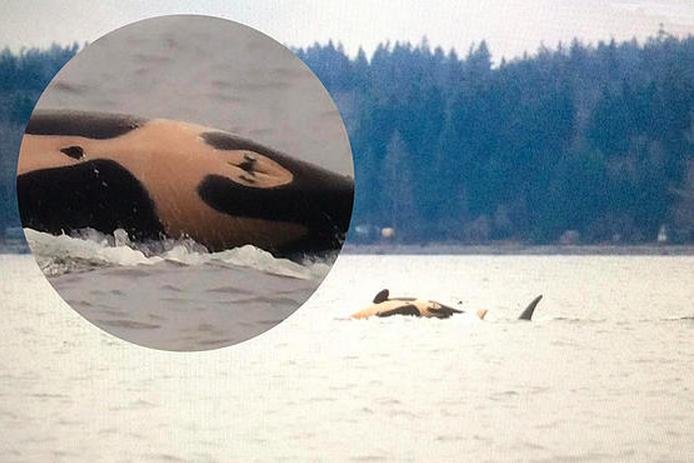Researchers were able to confirm J-50's gender with a photo of her underbelly. Photo by J. Cogan/Center for Whale Research
SEATTLE, Jan. 8 (UPI) -- With seas momentarily calm in the Strait of Georgia off British Columbia, scientists have finally been able to get close enough to determine the sex of the newly birthed orca calf, J-50. The new baby killer whale is female, biologists confirmed Wednesday.
"Good News! It is a Girl!" scientists at the Center for Whale Research announced in a blog post. J-50 is the 78th orca in the population of whales known as J-pod, an endangered group of orcas that mostly cruises the waters off the coast of Washington state and British Columbia. It's the first newborn orca the J-pod has welcomed in two years.
J-50 was spotted Dec. 30;; she was estimated at the time to be anywhere from 4 to 10 days old. While researchers can now confirm the newborn's gender -- having been able to snap photos of her underside and spot her female sex organ -- they still aren't sure who her mother is
The calf "quickly became the subject of mystery because it was swimming alongside a female whale that is estimated to be 43 years old -- beyond the age calculated for reproductive senescence in these whales," officials wrote in an update Wednesday.
That 43-year-old is J-16. She has birthed five orcas in her lifetime, three of which have survived into adulthood and remain by her side. Biologists believe J-50 could be the offspring of J-16's 16-year-old daughter, J-36, who has been primed for pregnancy for some time. But researchers have not been able to locate her in recent days.
"The presumed maternities in our catalog now spanning 40 years of precise photo identification have all been verified by genetic studies, so we have to be careful and not leap to conclusions about exact relationships from only two sightings of this baby," biologists at the researcher center specified.
Scientists will continue to monitor the calf and the rest of her matrilineal family in the coming days and weeks. Though Pacific Northwest orcas made a comeback in the 1990s and 2000s, they've seen a decline more recently. J-50 is a positive sign for a vulnerable population, but infancy for killer whales can be particularly precarious.















